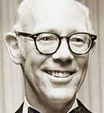 Forty years after the desegregation of the Boston public schools, the Boston Globe remembers the court decision and the late judge who made it: U.S. District Judge W. Arthur Garrity Jr, a member of the class of 1941 at the College of the Holy Cross. The decision, which was the result of a lawsuit alleging that the public schools were segregated and offering inferior education to black students, was not expected to go over well, nor did it. Brian LeClair, a law clerk who worked for Garrity at the time told the Globe that the judge, “knew full well that there were people that would not accept it, that were blind to the facts or just didn’t care about the facts. He knew there was going to be a lot of opposition.”
Forty years after the desegregation of the Boston public schools, the Boston Globe remembers the court decision and the late judge who made it: U.S. District Judge W. Arthur Garrity Jr, a member of the class of 1941 at the College of the Holy Cross. The decision, which was the result of a lawsuit alleging that the public schools were segregated and offering inferior education to black students, was not expected to go over well, nor did it. Brian LeClair, a law clerk who worked for Garrity at the time told the Globe that the judge, “knew full well that there were people that would not accept it, that were blind to the facts or just didn’t care about the facts. He knew there was going to be a lot of opposition.”
The decision led to the reassignment of students, teachers and administrators to new schools in unfamiliar neighborhoods. Like other judges presiding over desegregation cases, Garrity received death threats and was assigned a federal marshal to protect him, but “never exhibited any signs that he himself was concerned for his safety,” his son, W. Garrity III told the Globe. Garrity III recalls a woman coming to their home after the decision had been made to talk to his father: “I have a distinct memory of him sitting on the step outside the house and spending maybe a half hour or so just talking to her about whatever her situation was in kind of a mild-mannered way, which was always his style, in an attempt to help her understand.”
Read the full article on the Boston Globe website.
This is a “Holy Cross in the News” item by Evangelia Stefanakos.
‘1974 busing decision led to strong opinions, reactions’
The Boston Globe
Read Time
1 Minute